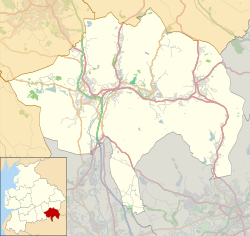Church in Lancashire, England
| St John the Evangelist's Church, Crawshawbooth | |
|---|---|
 St John the Evangelist's Church, Crawshawbooth, St John the Evangelist's Church, Crawshawbooth,from the southwest | |
 | |
| 53°43′21″N 2°17′21″W / 53.7226°N 2.2892°W / 53.7226; -2.2892 | |
| OS grid reference | SD 810,252 |
| Location | Crawshawbooth, near Rawtenstall, Lancashire |
| Country | England |
| Denomination | Anglican |
| Website | St John, Crawshawbooth |
| History | |
| Status | Parish church |
| Dedication | Saint John the Evangelist |
| Associated people | Thomas Brooks, 1st Baron Crawshaw |
| Architecture | |
| Functional status | Non-Active |
| Heritage designation | Grade II* |
| Designated | 7 June 1971 |
| Architect(s) | Paley, Austin and Paley |
| Architectural type | Church |
| Style | Gothic Revival |
| Groundbreaking | 1890 |
| Completed | 1892 |
| Administration | |
| Province | York |
| Diocese | Manchester |
| Archdeaconry | Bolton |
| Deanery | Rossendale |
| Parish | St John Crawshawbooth |
| Clergy | |
| Vicar(s) | Revd Dr J. S. Montgomery |
St John the Evangelist's Church is in the village of Crawshawbooth, near Rawtenstall, Lancashire, England. It is a redundant Anglican parish church formerly in the deanery of Rossendale, the archdeaconry of Bolton, and the diocese of Manchester. Its benefice has been united with that of St Mary and All Saints, Goodshaw. The church is recorded in the National Heritage List for England as a designated Grade II* listed building.
History
St John's was built between 1890 and 1892 to a design by the Lancaster architects Paley, Austin and Paley. The estimated cost of the church was £6,800 but, because of problems with the foundations, its final cost, including the fittings, was nearer to £12,000 (equivalent to £1,650,000 in 2023). It provided seating for 616 people. Financial donations towards the site and structure of the church were made by Thomas Brooks, 1st Baron Crawshaw of Crawshaw Hall. Because of diminishing numbers attending the church, and because of thefts of lead from the roof of the church, the congregation has decided to opt for the church to be declared redundant. The church was declared redundant on 20 February 2012.
Architecture
Exterior
The church is constructed in sandstone with Yorkshire stone dressings and is roofed in green Cumberland slate. Its architectural style is Perpendicular. The plan consists of a nave and chancel in one range, north and south aisles, a south transept, and a north transept above which rises a tower. A clerestory rises above the aisles along the length of the nave, to the south of the chancel is a chapel, and to its north is a vestry. There is a porch in the westernmost bay of the south aisle, and another porch in the angle of the south transept. On each side of the clerestory are ten square-headed two-light windows. The west window has five lights and contains intersecting tracery. Along the aisles are buttresses and two-light windows. The south transept also has buttresses, and a large five-light window containing Perpendicular and curvilinear tracery. The chancel has a large east window with six lights containing Perpendicular tracery. The tower has diagonal corner buttresses that rise to octagonal turrets surmounted by crocketed pinnacles. The summit of the tower has an embattled parapet.
Interior
The interior of the church is lined with red Rainhill sandstone. The five-bay arcades are carried alternately on round and octagonal columns. The chancel arch is high, and has two orders of moulding. There are carved wooden screens between the nave and the chancel, and between the chancel and the north transept. Some of the choir stalls have elaborately carved crocketed canopies containing statues. The reredos dates from the 20th century, and contains statues of the Four Evangelists. The font is hexagonal. In the church are memorials to members of the Brooks family. Inside the tower, and near to the tower, are carved texts from Psalm 148.
Future
As of 2020 the Church is on the English Heritage "Heritage at Risk Register". With its condition being described as "Very Bad".
The Church was also listed on the Victorian Society's 2013 "Top 10 Endangered Buildings" List.
A local group "Save St Johns" is trying to find a new use for the church to benefit both local people and business.
See also
References
- St John, Crawshawbooth, Church of England, retrieved 19 October 2011
- ^ Historic England, "Church of St John the Evangelist, Crawshawbooth (1163934)", National Heritage List for England, retrieved 19 October 2011
- Price, James (1998), Sharpe, Paley and Austin: A Lancaster Architectural Practice 1836–1942, Lancaster: Centre for North-West Regional Studies, p. 90, ISBN 1-86220-054-8
- UK Retail Price Index inflation figures are based on data from Clark, Gregory (2017). "The Annual RPI and Average Earnings for Britain, 1209 to Present (New Series)". MeasuringWorth. Retrieved 7 May 2024.
- ^ Brandwood, Geoff; Austin, Tim; Hughes, John; Price, James (2012), The Architecture of Sharpe, Paley and Austin, Swindon: English Heritage, pp. 149, 238–239, ISBN 978-1-84802-049-8
- ^ Hartwell, Clare; Pevsner, Nikolaus (2009) , Lancashire: North, The Buildings of England, New Haven and London: Yale University Press, pp. 562–563, ISBN 978-0-300-12667-9
- Lead theft Crawshawbooth church in Rossendale to close, retrieved 16 January 2014
- Diocese of Manchester: All Schemes (PDF), Church Commissioners/Statistics, Church of England, 2012, p. 5, retrieved 16 January 2014
- "Church of St John the Evangelist, Burnley Road, Crawshawbooth, Rawtenstall - Rossendale", English Heritage at Risk Register, retrieved 29 June 2020
- "The Victorian Society", retrieved 10 March 2015
- "Save St.Johns", retrieved 10 March 2015
| Buildings and structures in the Borough of Rossendale | |||||
|---|---|---|---|---|---|
| Grade II* |
| ||||
| Grade II |
| ||||
| Unlisted | |||||
| Listed in | |||||